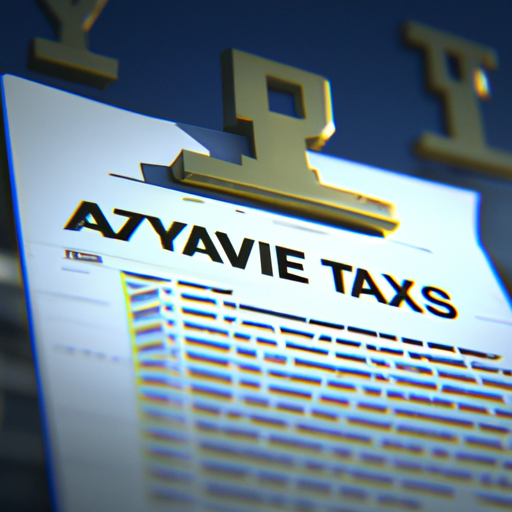-
Table of Contents
“Crypto Taxes: Get Ahead of the Curve and Stay Compliant!”
Introduction
Cryptocurrency has become increasingly popular in recent years, and with that popularity comes the need to understand the tax implications of investing and trading in digital assets. Cryptocurrency taxes can be complicated and confusing, but it is important to understand the laws and regulations related to cryptocurrency investments and trading in order to ensure that you are compliant with the law. This article will provide an overview of the tax laws and regulations related to cryptocurrency investments and trading, as well as some tips for filing your taxes.
How to Calculate Crypto Taxes: A Step-by-Step Guide
Cryptocurrency taxes can be a confusing and intimidating topic for many people. However, understanding the basics of how to calculate crypto taxes is not as difficult as it may seem. This step-by-step guide will help you understand the basics of crypto taxes and how to calculate them.
Step 1: Gather Your Crypto Tax Records
The first step in calculating your crypto taxes is to gather all of your crypto tax records. This includes any records of cryptocurrency transactions, such as purchases, sales, trades, and transfers. You should also include any records of income from cryptocurrency activities, such as mining, staking, and airdrops.
Step 2: Calculate Your Cost Basis
Your cost basis is the amount of money you have invested in a cryptocurrency. This is important because it is used to calculate your capital gains or losses when you sell or trade your cryptocurrency. To calculate your cost basis, you need to add up the total amount of money you have invested in the cryptocurrency, including any fees or commissions you paid.
Step 3: Calculate Your Capital Gains or Losses
Once you have calculated your cost basis, you can then calculate your capital gains or losses. To do this, you need to subtract your cost basis from the amount you received when you sold or traded your cryptocurrency. If the amount you received is greater than your cost basis, then you have a capital gain. If the amount you received is less than your cost basis, then you have a capital loss.
Step 4: Calculate Your Taxable Income
Once you have calculated your capital gains or losses, you can then calculate your taxable income. This is the amount of money you owe in taxes on your cryptocurrency transactions. The amount of tax you owe depends on the type of cryptocurrency transaction and your tax bracket.
Step 5: File Your Crypto Taxes
The final step in calculating your crypto taxes is to file your taxes. Depending on where you live, you may need to file a separate tax return for your cryptocurrency transactions. You should also make sure to include any applicable deductions or credits that you may be eligible for.
By following these steps, you can easily calculate your crypto taxes and file your taxes accurately. It is important to remember that cryptocurrency taxes can be complicated, so it is always best to consult a tax professional if you have any questions or concerns.
What Are the Tax Implications of Crypto Mining?
Crypto mining is a process of verifying and adding transactions to the blockchain ledger, and miners are rewarded with cryptocurrency for their efforts. While crypto mining can be a lucrative endeavor, it is important to understand the tax implications associated with it.
In the United States, the Internal Revenue Service (IRS) considers cryptocurrency to be property, and any income derived from crypto mining is subject to taxation. This means that miners must report any profits or losses from their mining activities on their tax returns. Additionally, miners must also keep records of their mining activities, including the cost of any equipment used, the amount of electricity consumed, and any other expenses related to the mining process.
In addition to income taxes, miners may also be subject to self-employment taxes. This means that miners must pay both the employer and employee portions of Social Security and Medicare taxes. Furthermore, miners may also be subject to capital gains taxes if they sell their mined cryptocurrency for a profit.
Finally, miners should also be aware of any local or state taxes that may apply to their crypto mining activities. Depending on the jurisdiction, miners may be subject to sales taxes, property taxes, or other taxes related to their mining activities.
In conclusion, crypto mining can be a lucrative endeavor, but miners should be aware of the various tax implications associated with it. Miners should keep records of their mining activities and be aware of any applicable income, self-employment, and capital gains taxes. Additionally, miners should also be aware of any local or state taxes that may apply to their mining activities.
What Are the Tax Implications of Crypto Gambling?

The tax implications of crypto gambling vary depending on the jurisdiction in which the activity takes place. Generally, crypto gambling is subject to the same tax rules as other forms of gambling, such as sports betting or casino games. In the United States, for example, gambling winnings are taxable income and must be reported on your federal income tax return. Depending on the amount of winnings, you may also be subject to state taxes.
In some countries, crypto gambling is not subject to the same tax rules as other forms of gambling. For example, in the United Kingdom, crypto gambling winnings are not subject to taxation. However, this does not mean that crypto gambling is tax-free. Any profits made from crypto gambling must still be reported to the relevant tax authorities.
In addition to taxes, crypto gambling may also be subject to other regulations. For example, some countries may require crypto gambling operators to obtain a license or register with the relevant authorities. It is important to check the local laws and regulations before engaging in crypto gambling.
In conclusion, the tax implications of crypto gambling vary depending on the jurisdiction in which the activity takes place. Generally, crypto gambling is subject to the same tax rules as other forms of gambling, but some countries may have different regulations. It is important to check the local laws and regulations before engaging in crypto gambling.
What Are the Tax Implications of Crypto Trading?
The tax implications of crypto trading vary depending on the country and the individual’s tax situation. In general, crypto trading is subject to capital gains taxes, which means that any profits made from trading crypto are subject to taxation. Depending on the country, the tax rate may be different for short-term and long-term gains. Additionally, some countries may require crypto traders to pay taxes on any income earned from trading, such as interest or dividends.
In the United States, crypto traders must report any gains or losses from trading on their tax returns. The Internal Revenue Service (IRS) considers crypto to be property, so any profits made from trading are subject to capital gains taxes. The tax rate depends on the individual’s income and the length of time the crypto was held. For example, short-term gains (crypto held for less than one year) are taxed at the same rate as ordinary income, while long-term gains (crypto held for more than one year) are taxed at a lower rate.
In the European Union, crypto trading is subject to capital gains taxes, but the tax rate varies from country to country. For example, in the UK, crypto traders must pay capital gains taxes on any profits made from trading, but the rate is lower than the rate for other investments.
In conclusion, crypto trading is subject to capital gains taxes in most countries, but the exact tax implications vary depending on the country and the individual’s tax situation. It is important for crypto traders to understand their local tax laws and to report any gains or losses on their tax returns.
What Are the Tax Implications of Crypto Airdrops?
Crypto airdrops are a form of cryptocurrency distribution that involves sending free tokens or coins to a large number of wallet addresses. While airdrops can be a great way to get free tokens, it is important to understand the tax implications of receiving them.
In the United States, the Internal Revenue Service (IRS) considers crypto airdrops to be taxable income. This means that any crypto airdrops you receive must be reported on your taxes. The amount of tax you owe will depend on the value of the tokens you receive and your individual tax situation.
In addition to reporting the income, you may also need to pay capital gains taxes on any profits you make from selling the tokens. This is because the IRS considers crypto airdrops to be a form of investment income.
Finally, it is important to note that the tax implications of crypto airdrops can vary from country to country. Therefore, it is important to research the tax laws in your jurisdiction before participating in an airdrop.
In conclusion, crypto airdrops can be a great way to get free tokens, but it is important to understand the tax implications of receiving them. In the United States, the IRS considers crypto airdrops to be taxable income, and you may also need to pay capital gains taxes on any profits you make from selling the tokens. It is important to research the tax laws in your jurisdiction before participating in an airdrop.
Conclusion
In conclusion, it is important to understand the tax laws and regulations related to cryptocurrency investments and trading. Cryptocurrency is a new and rapidly evolving asset class, and it is important to stay up to date on the latest developments in order to ensure that you are compliant with the law. It is also important to consult with a qualified tax professional to ensure that you are taking advantage of all available deductions and credits. By understanding the tax implications of cryptocurrency investments and trading, you can maximize your returns and minimize your tax liability.




